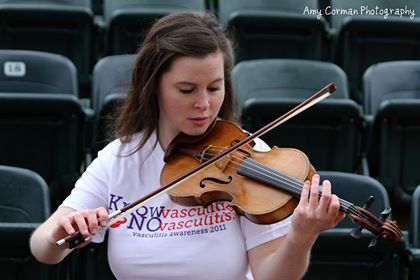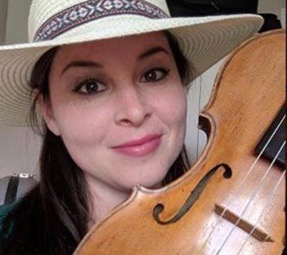Young Musician’s ‘Violin for Vasculitis’ Charity Strikes a Chord with Fellow Patients

Allison Ross, the founder of Violin for Vasculitis, is more than halfway toward her goal of performing in all 50 states to create nationwide awareness of ANCA vasculitis. (Photo courtesy Amy Corman Photography)
Allison Lint Ross looked like a typical healthy 16-year-old when she suddenly began to experience breathing difficulties, weakness, and disorientation that landed her in the emergency room.
The talented violinist nearly died that day in 2004. Doctors discovered a lung hemorrhage and signs that her body was shutting down. They saved her with medication that countered the inflammation raging through her body, although they were unable to diagnose her condition for five months.
Ross eventually learned she was one of three million Americans with vasculitis — blood-vessel swelling that disrupts the flow of oxygen to vital organs. The diagnosis took nearly half a year because “the symptoms are really hard to pinpoint, and they can look different in each case,” Ross told ANCA Vasculitis News in a phone interview.
In 2011, seven years after her diagnosis, she started Violin for Vasculitis (V4V) — musical performances that offer hope to those with her condition and awareness to those who don’t know about the disease.
V4V concerts combine entertainment and information about the disease. Ross’s goal is to perform in all 50 states; so far, she’s done concerts in 27 states, putting this native from the Akron, Ohio, area more than halfway there.
Now 31 and living in the Kansas City area, Ross has been diagnosed with granulomatosis with polyangiitis, or GPA. It is one of three types of an autoimmune disease called anti-neutrophil cytoplasmic antibodies (ANCA) vasculitis.
In remission nearly seven years
In an autoimmune disease, the immune system attacks healthy organs and tissue instead of invaders such as bacteria. ANCA vasculitis affects about one in 50,000 people. Like all versions of the disorder, GPA can affect any organ, but it typically strikes the lungs and kidneys.
After doctors tried one medication after another without much success, a transfusion with Genentech’s Rituxan (rituximab) in January 2013, when Ross was 26, succeeded in putting her disease into remission.
“I’m happy to say that I’ve been in remission for six and a half years,” said Ross, who knows that many of those with vasculitis aren’t as fortunate. “There are patients all over the world who sometimes have trouble getting out of bed in the morning.”
Ross said she tries not to give patients at her performances a false sense of hope, but tells them: “I was in the lowest, darkest spot I possibly could have been in” before improving.
Playing the violin since she was 7, Ross was talented enough to attend Ohio’s Oberlin Conservatory, and join the Akron Symphony Orchestra and later Missouri’s St. Joseph Symphony Orchestra, where she continues to play.
Now she teaches music and accompanies a high school choir in Kansas City, where her husband Brian is a pharmacy technician at the University of Kansas Medical Center. She’s also on the board of the Kansas City-based national Vasculitis Foundation, where she represents the interests of young adult patients.
Music mixed with information
In 2014, a segment on CNN’s Human Factor sparked nationwide interest in V4V.
Although the shows are free, audiences usually chip in a few hundred dollars to keep the mission rolling.
Ross comes up with about half the venues for her concerts, typically by suggesting that other musicians join her in a concert in their hometown. The rest of the location ideas come from people who have heard about V4V and contacted her.
A typical performance alternates music with information about vasculitis — a format that a friend has dubbed an “informance” (part information event and part performance).
“I usually start with a bang, a fancy piece everyone likes to hear,” Ross said. “Then I’ll talk for a little bit, go back into the music, then take some questions. Then I’ll talk some more and maybe invite up a guest,” such as a vasculitis expert or patient.
Classical music dominated her first performances, she said, but over time she has added jazz, folk, and other genres.
“I always do a solo Bach because it’s accessible, and I’ve played it since middle school,” she said.
These days, the performance depends on the other musicians’ preferences as well as the audience’s. Her concert in the country-music capital of Nashville, for example, included bluegrass music.
At the moment, Ross is taking a break from performing to adjust to a new job and to being a newlywed. Her 2020 schedule is likely to include cities as diverse as Taos, New Mexico; Los Gatos, California; and Anchorage, Alaska.
Rewarding concert experiences
The Vasculitis Foundation promotes Ross’s performances and helps her find concert sponsors. She also spreads the word through V4V’s website, Facebook page, and Twitter account @violin4v. In addition, Ross makes TV appearances and talks with journalists in cities where she performs.
Although entertaining people is a joy in itself, some of her most rewarding concert experiences have come from her interactions with patients.
“A lady approached me who you could just tell by looking at her was very sick,” Ross said, about an incident after a concert in Madision, Wisconsin. The violinist asked how the woman’s treatment was going, and the woman told her about the medication she was taking.
“’I’m glad to know about your treatment,’” Ross replied to the woman, “’but how are you doing mentally? Are you handling it?’”
The woman said she was all right, but that her condition was still new and overwhelming.
“’I want you to know you’re not alone,’” Ross said. “’There’s a huge community of us. Have you found your community of support yet?’”
The woman fell silent, looked around at the people in the room, and replied, “’Well, now I think I have.’”
This was one of those moments that made all of the work that Ross has poured into V4V worthwhile.







